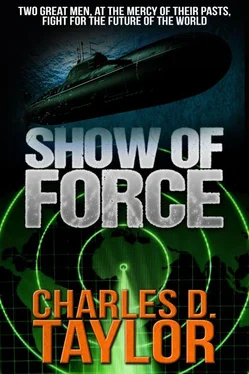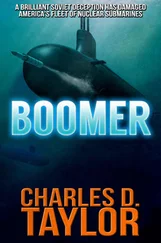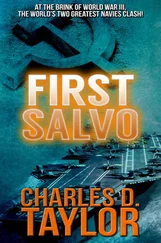The second problem inherent to both sides was the inability to use their master computers for the job they had been designed for. The Americans had a specially designed unit at Johns Hopkins that could advise each tactical group through its own computer as a battle was in progress, revising assignments as skips or aircraft were lost or achieved a superiority, often before those on scene could make such a judgment themselves. The Russians had a similar setup.
Each ship had its own computer that could function to fight alone intelligently. In addition, it was tied into the command unit, which could better assign each ship to act in whatever dimension best suited its weapons system and location within the force. But at this point, both master computers were limited by the information that had been fed to them up to the time the satellite war had started. Now all the data amassed by the master computers during many fleet exercises were unavailable to them. After the billions of dollars and rubles spent over the years by geniuses who had been educated to install the sophisticated equipment in these weapons platforms, they were essentially going to fight blind.
David Charles was as uneasy as Alex Kupinsky. He had spent the better part of the day analyzing the information about the other force that had been available in Nimitz' computer. He knew every ship in the Russian force, its performance characteristics, the effectiveness of its weapons systems, even each individual ship's captain, along with the man's education and career pattern.
He had been able to come up with few revelations. The Russians had more ships and certainly more weapons individually, but the facts seemed to be that they might not be as effective as his own. The smaller Soviet ships bristled with detection systems and a variety of weapons. On the other hand, it appeared to him that these systems took up so much space that the ships might not have the capacity to carry enough backup ammunition. Their first-strike capability was awesome, but they did not have the storage capacity to maintain a fight for long. In addition, only the submarines had a long-range missile to attack surface ships, but to do this the subs had to be on the surface also. Their surface-to-surface capabilities were mostly line of sight rather than over the horizon. David also noted that the Soviet fleet was now a bit older than his own. With the problem.if quality control that the Russians seemed to have, this could also be to his advantage. But he needed more input, of die human kind, and he called Captain Dailey back to his cabin.
"Bill, what have your young geniuses come up with today that I don't already know?"
"Well, sir, I've got a couple of men who are rather disappointed that they're out of touch with Hopkins, and they didn't know what to do with themselves. If they were on the bridge, they wouldn't know which end of the binoculars to use, but they know how to dig. They came up with a couple of ideas you might like, things that the computer doesn't have stored." He took a deep breath. "Number one, the Russians have a very rigid command-and-control system, probably the result of mistrust of each other. Command is centralized, and there is a distinct possibility that on-scene commanders, or an individual ship's captain, might hesitate in making a decision if it doesn't come down from above. In other words, one of my boys said we ought to take a lesson from the Indians. Hide behind trees and pop them off one by one."
"I assume they meant using my submarines "
"I think so, sir, but I've learned never to ask them such direct questions. It confuses them," Dailey answered drily.
"I hadn't thought too much about that idea, Bill, but they may be right. When I sent those submarines off this morning, maybe it was just dumb luck. But I figured we ought to try to cut that force of theirs down as much as we could, since they've got a lot of firepower face to face."
"Another thing one of them remembered was a statement made a few years back when we didn't have the cruise missiles available. Someone said that the Russians had a great advantage because all they had to do was hit a ship with a missile, but we had to hit a missile with a missile. So, if we keep them busy with what seems like superior airpower, this limits their ability to fire surface to surface. And if we can keep their submarines down, they can only fire their cruise missiles about thirty miles when they're underwater. In other words, if we keep them busy enough firing missiles at our missiles, and keep their subs from surfacing, then our subs can go to work on that one-to-one basis, from behind the trees."
"Bill, I think you may have lost this morning's bottle of brandy to your brain children. I like the idea of using our subs to best advantage, but you might also ask your experts how they expect this perfect surface battle. Explain to them the first-strike capability Alex has, and ask how I'm going to keep them busy with ail those missiles of my own. Tell 'em I'll end up an Indian with an assful of arrows." He grinned. "Don't make them feel bad. I'll buy a bottle of brandy for them if you won't." He was thoughtful for just a second, and then he shuffled through a sheaf of printouts, finally finding the one he was looking for. "Here, give this to them. It's the details of the Russian missiles and their ranges. If they can figure out what I can do with those Aegis ships to counter that first strike, I'll take back what I said about that assful of arrows."
Dailey looked at his watch. He hadn't been outside to see or smell the ocean since morning, and now he knew the sun was setting. "We'll be close enough to each other to probe by dawn, Admiral. Are you going to keep going or stand off?"
"I'm going to go right at them, Bill. We have to find out more about that first-strike capability and then see what their staying power is like. I'm going to use my subs like Indians at first light, and try to knock a couple of them off. Create some confusion. And I'm sure I could take another bet with you that that's just what Alex will do."
"You seem pretty sure of that, sir."
"The old central-control idea again, Bill. Alex is one of the few commanders they have who is willing to strike out on his own. He knows a lot of his captains are going to be hesitant, and I'll bet he's going to try the cavalry approach, too — show them that they can steam right into the enemy. I think he's got too much confidence in that first strike." He cocked his head to the side. "What do you think?"
"Well, if he heads right at us, I hope you're still around to collect that, brandy."
"We will be, I think, Bill. The Russians are going to waste a lot of aircraft trying to sink Nimitz, and we're going to have a screen of metal around this ship. They'll try to neutralize the force by sinking the carrier, and this is the one thing I can't afford to lose."
By 0700 the next morning the- two forces were within two-hundred miles of each other. Within six hours they could be crossing each other's screen. If the Americans increased certain if their leading ships to flank speed, they would fire surface-to-surface missiles by 1000. It was also important to hold down the Russian submarines to minimize their missile range. Both Nimitz and Lenin had dropped to the rear of their groups for additional protection and to launch their first air strikes.
While this was taking place on the surface, there was an entirely different strategy taking place under the sea. David Charles had given his attack-submarine commanders the autonomy they needed to carry out his orders. His Indians moved to positions on the southeast and northwest quadrants along the Soviet line of approach. If there could be wolfpack tactics in the nuclear age, this was it. On each side of the approaching force they had staggered themselves for both missile and torpedo attack. The idea was for the boats at a longer distance to fire missiles first, creating havoc among the Soviet ships on the outer perimeter. Then, the two subs that were lying silent on either flank would make a rapid final approach and fire torpedoes into the cruiser-size ships that remained untouched. With luck, they might even close Lenin. Before the satellites tied into Hopkins had been destroyed, each Russian surface craft had been identified and the memory bank of each submarine computer had been checked to ensure they contained the sound characteristics of their enemy. Passive listening devices could isolate a target, identify it, provide a solution if the captain chose to attack that particular target, and fire a missile that would be well within lock-on range before the surface ship could take evasive action.
Читать дальше












